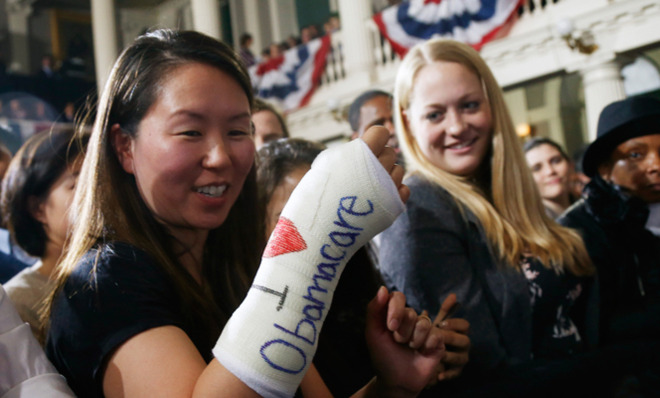The real reason millennials should embrace ObamaCare
Younger Americans bear the brunt of ObamaCare's costs. But that is in keeping with the law's spirit of solidarity.


A free daily email with the biggest news stories of the day – and the best features from TheWeek.com
You are now subscribed
Your newsletter sign-up was successful
Amidst all the good news surrounding ObamaCare, the law continues to face charges that it delivers young people a raw deal.
Last week, while arguing that our political institutions in general are letting down young Americans, Catherine Rampell of The Washington Post pointed to ObamaCare's requirement that "'young invincibles' who join the individual market must pay rates much higher than are actuarially fair to subsidize older, sicker, more expensive Americans."
Elsewhere, the close monitoring of the number of young adults enrolling on the health exchanges has been a constant reminder of the law's reliance on this group for financing. But is this really unfair to young Americans?
The Week
Escape your echo chamber. Get the facts behind the news, plus analysis from multiple perspectives.

Sign up for The Week's Free Newsletters
From our morning news briefing to a weekly Good News Newsletter, get the best of The Week delivered directly to your inbox.
From our morning news briefing to a weekly Good News Newsletter, get the best of The Week delivered directly to your inbox.
There are certainly provisions of ObamaCare that benefit young people. They can now stay on their parents' health insurance plan until they turn 26. Many are also eligible for subsidies if they purchase insurance on health exchanges. Indeed, we've already seen sharp declines in the rate of young adults who are uninsured.
Nonetheless, ObamaCare does call on young people to help finance universal health care in two significant ways. First, the law restricts the ability of insurers to differentiate premiums based on age. Under ObamaCare, insurers can only charge a 64-year-old three times the amount that they would a 21-year-old. This means that young people will pay more and older people will pay less than they would have otherwise.
Second, the individual mandate induces young people to purchase insurance despite premiums that are outsized in comparison to their medical risk. In effect, the individual mandate and age-rating restrictions act as a hidden tax on the young, whose insurance premiums are used to pay for the care of the old and the sick.
One common defense from the law's supporters is that ObamaCare asks young people to pay more today in order to pay less tomorrow. Under this argument, health care reform amounts to a social contract that asks young people to buy into a regulatory scheme that will lower their payments when they become older and riskier to insure. ObamaCare then begins to resemble a savings device like Social Security, which evens out spending over a lifetime.
A free daily email with the biggest news stories of the day – and the best features from TheWeek.com
This argument, however, is vulnerable to the same sorts of doubts that have young people losing faith in Social Security. The regulatory structure could conceivably collapse before they grow old enough to reap its benefits. The long-term gains might not be enough to offset the present losses.
This consumption-smoothing argument also suffers from a deeper flaw. Obsessing about whether ObamaCare leaves young people net winners — which it may very well do — is at odds with the principal ethic driving health care reform. An argument that asks "what's in it for me?" ignores the communal instinct behind universal health care.
Health insurance is inherently a social institution. Rather than bearing the costs of medical risk individually, we spread them out over a wider community.
ObamaCare doubles down on this, aiming to expand affordable health insurance to all Americans. It binds us more closely as a national community to ensure that no one is excluded from health insurance or forced to bear crushing medical costs on their own.
A richer defense of ObamaCare's treatment of the young — one that is consistent with the spirit of the law — is grounded in social solidarity. It's fair for the young and healthy to subsidize the old and sick. Much of our health status is random. Some of us are blessed with good health, while others develop costly and debilitating conditions through no fault of their own. Our genetic endowments and sheer luck are not earned, and there's no reason why we must accept that brute chance be reflected in our insurance premiums.
It's also just to draw on the means of the healthy to aid the sick. Consider two people that earn similar incomes: one a healthy 25-year-old, and the other a person with a preexisting condition. All things being equal, the healthy 25-year-old is the better off of the two, so it is fair to redistribute some of her resources to the sick person.
ObamaCare's spirit of solidarity is not limitless though. It still holds individuals responsible for self-imposed risks of higher medical costs, like smoking or living in a place where health care is expensive. Insurers can still charge people higher premiums based on these choices.
On the whole, ObamaCare nudges us toward a greater sense of communal solidarity. In President Obama's 2009 address to Congress on health care reform, he appealed to our sense that "we are all in this together; that when fortune turns against one of us, others are there to lend a helping hand." To tally winners and losers under health care reform — to ask "what's in it for me?" — is to disregard the basic impulse that inspired universal health care in the first place.
Joel Dodge writes about politics, law, and domestic policy for The Week and at his blog. He is a member of the Boston University School of Law's class of 2014.
-
 The environmental cost of GLP-1s
The environmental cost of GLP-1sThe explainer Producing the drugs is a dirty process
-
 Greenland’s capital becomes ground zero for the country’s diplomatic straits
Greenland’s capital becomes ground zero for the country’s diplomatic straitsIN THE SPOTLIGHT A flurry of new consular activity in Nuuk shows how important Greenland has become to Europeans’ anxiety about American imperialism
-
 ‘This is something that happens all too often’
‘This is something that happens all too often’Instant Opinion Opinion, comment and editorials of the day
